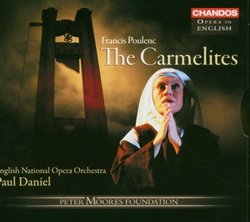| All Artists: Ashley Holland, David Stephenson, Gary Coward, Roland Wood, Toby Stafford-Allen, William Berger, Francis Poulenc, Paul Daniel, Anne-Marie Gibbons, Felicity Palmer, Jane Powell, English National Opera Orchestra, Catrin Wyn Davies, Josephine Barstow, Natalie Herman, Orla Boylan, Sarah Tynan, James Edwards, Peter Wedd, Ryland Davies Title: Poulenc: The Carmelites Members Wishing: 0 Total Copies: 0 Label: Chandos Original Release Date: 1/1/2006 Re-Release Date: 10/17/2006 Genre: Classical Styles: Opera & Classical Vocal, Historical Periods, Modern, 20th, & 21st Century Number of Discs: 2 SwapaCD Credits: 2 UPCs: 095115313428, 095115313428 |
Search - Ashley Holland, David Stephenson, Gary Coward :: Poulenc: The Carmelites
 | Ashley Holland, David Stephenson, Gary Coward Poulenc: The Carmelites Genre: Classical No Description Available. Genre: Classical Music Media Format: Compact Disk Rating: Release Date: 17-OCT-2006 |
Larger Image |
CD DetailsSynopsis
Product Description No Description Available. Genre: Classical Music Media Format: Compact Disk Rating: Release Date: 17-OCT-2006 Similarly Requested CDs
|
CD ReviewsENO proves it works JUST FINE in English R. Gregory Capaldini | Arlington, VA United States | 03/17/2007 (5 out of 5 stars) "When the Met did its first production of Poulenc's Dialogues of the Carmelites in 1977, there was only one recording of this opera available in the U.S., the one recorded during the composer's lifetime. Then came a video from Australia in the late '80s, a spiffy new CD set from the Lyon Opera in 1992, and with the composer's centennial in 1999 several other videos and soundtracks, including ones in German and the original Italian (for the La Scala premiere in 1957). It was Poulenc himself who wanted the opera to be sung in translation, and Chandos has honored his wish by committing to CD a fine production by the English National Opera. This succinctly-titled version uses a new libretto with numerous subtle revisions that make the text easier to sing, e.g., the safe house has been moved to "five, rue Saint-Denis" from number two, with this and other proper names pronounced in French. All this would be for naught if the singers weren't conscientious about diction, but they generally are. Besides Catrin Wyn-Davies as Blanche, kudos go to Ashley Holland as her father and Felicity Palmer as the Old Prioress. For once, though, it's Mother Marie who is most vividly projected; Josephine Barstow, a veteran Tosca and Salome, sings her as the kind of nun who runs inner-city Catholic schools like clockwork. I'd give a medal to conductor Paul Daniel who paces the text very intelligently and draws from his players the most finely shaped and best-balanced orchestral accompaniment you'll ever find. He presumably is also responsible for cutting some well-meaning but expendable passages, notably the clunky instrumental tag after the Ave Maria in Act II (the Latin prayers get Poulenc's best music, interestingly) and the interlude and spoken street vignette preceding the jail scene in Act III. He also rigs a clever repeat to make the martyrdom vote proceed less hurriedly onstage, but in all cases the vocal parts are left intact. Roger Nicols, as always, provides excellent annotations, though I believe an over-zealous editor created inaccuracies by condensation: No, this isn't Poulenc's "only serious opera" - La voix humaine, with its suicidal heroine, is about as bleak as they come - and while Georges Brenanos didn't live to see his screenplay produced, a non-musical film adaptation was released in 1960 with Jeanne Moreau as Mother Marie. A cautionary note about this CD may be in order for the squeamish, since the noise of the guillotine in the last scene is gratingly realistic, with another brief but chilling effect best left unmentioned to preserve its shock value." A sound recording. Great to understand dialogue KC | London, England | 10/22/2006 (5 out of 5 stars) "For some, Poulenc's study of religious persecution in the wake of the French Revolution remains one of the great affirmations of human dignity in the face of oppression. For others, it's a reactionary work, deeply suspect in its tacit, but forceful, equation of the Terror with the Nazi occupation of France. However you view it, its impact in performance can be formidable, though this new English language version, recorded in tandem with English National Opera's revival last year, pulls its punches somewhat variably.
It's conducted with implacable menace by Paul Daniel, and superbly played. The singing, however, is uneven. Catrin Wyn-Davies is an impressive Blanche, tellingly exposing the neuroses that lie behind the girl's spirituality, while Josephine Barstow is truly terrifying as the near-fundamentalist Mother Marie." |










